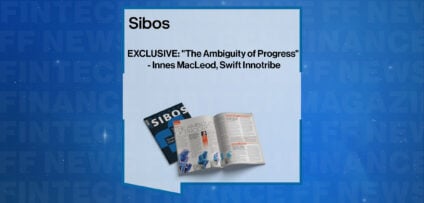Breaking News

EXCLUSIVE: “For One, For All” – Liliana Fratini Passi, CBI in “Discover Sibos 2025”
Europe’s new Instant Payment Regulation poses challenges for financial services companies, SEPA-wide. And they’re just the sort of pain points that Italy’s CBI has been building a utility to address
October 2025 is the deadline for the EU’s Instant Payment Regulation (IPR), when banks and other payment services providers (PSPs) must be in a position to both issue and receive instant payments in a fully compliant way. Electronic money institutions (EMIs) have until 2027 to get fully in line. As well as offering instant credit transfers around the clock, IPR’s four other obligations for providers are offering verification-of-payee (VoP) for every transaction; ensuring equal charges for all payment types; upholding sanctions screening rules through daily service user checks; and reporting annually on credit transfer and account charges, as well as their share of sanctions-related rejections.
Clearly, there is a lot for organisations to do to comply with this rule change,designed to enhance the efficiency and security of payments taking place within the Single Euro Payments Area (SEPA), as well as in the UK and other countries that are not fully (or at all) part of the EU, like Switzerland. These face the same requirements but have potentially greater challenges to meet them.
Italy’s financial industry utility company CBI is among the organisations coming to their rescue, with solutions to some of the key pain points around IPR readiness, such as VoP capability. It has launched its new Name Check functionality for this purpose, as well as leading on the development of alternative payment mechanisms via Request to Pay (RTP).
CBI serves more than 400 institutions and PSPs, representing in excess of 80 per cent of the Italian market, and through them extends its payment services to around three million Italian corporates and more than 11 million consumers, helping them settle their bills as well as public administration payment notices.
This major industry influencer has contributed its experience to the process of developing the IPR itself, participating in the regulatory sandbox organised by the Bank of Italy as the national competent authority, as well as designing practical solutions for facilitating the regulation’s widespread adoption. It is clearly working hard to ensure readiness among the many organisations it represents.
And it’s able to do that because MD Liliana Fratini Passi has radically reshaped CBI’s offering since joining in 2011. Describing it now as ‘the industry utility’ for Italian financial services, she explains what she believes the organisation is bringing to IPR integration, and outlines her wider vision for the organisation.
“We define ourselves as a fintech with 30 years of history, serving our customers via a business-to-consumer approach,” she says. “Our mission is to develop centralised infrastructures and innovative services that promote digital financial ecosystems, supporting our PSPs with digital transformation and promoting open banking and open finance functionalities. This is not only to comply with regulations but also to be able to offer new, secure functionalities to their customers, which include public administrations, corporates and consumers.”
One of the biggest challenges to achieving universally instant payments across the SEPA region is ensuring they arrive safely at their intended destinations while screening for financial crime. That’s something Name Check is designed to tackle.
“Fully compliant with the European Payment Council VoP scheme under the IPR, Name Check consists of a centralised, multi-bank platform that enables us to act as a routing and verification mechanism, ensuring secure and efficient data exchange between all PSPs and financial institutions across Europe,” explains Fratini Passi. “Already live, it has been adopted by a growing number of PSPs, as a ready-to-use, compliant solution that significantly reduces the time and costs associated with regulatory adaptation. It allows them to verify payments in real time, making the correct association between the IBAN code and the beneficiary name before the payer processes the payment.
“That provides greater assurance that payments will go to the correct recipient and gives more protection against fraud.” Another major barrier to IPR adoption is sketchy payment rails in some parts of the SEPA, for which Request To Pay is one potentially powerful foil, using existing payments rails as a bridge to achieve the necessary interconnectivity of payments where more sophisticated capability is lacking.
“CBI’s strategic vision embraces a B2B2C model, positioning Request to Pay (RTP) as a pivotal enabler of seamless connectivity among financial institutions, corporate entities and public administrations”
CBI helped spot the potential of this technology early on and has led extensive innovation around it, says Fratini Passi. She sees it being used to support the wider industry transformation that’s heralded by both the IPR and the third revised Payment Services Directive (PSD3).
The latter is imminent for 2026/7 and will catalyse a rapid shift towards truly open banking through increased data sharing.
“We’re working on the definition of the service proposal to foster adoption of RTP for domestic and cross-border payments,” explains Fratini Passi. “All PSPs will be able to join our RTP scheme to access pan-European platforms and use the solution en masse through a single access point for sending and receiving requests to pay. Our aim is to efficiently enable all PSPs to do this by delegating responsibility to CBI for guaranteeing connection, for the harmonisation of standards, technical rules and regulatory compliance, and for interfacing between the various actors involved.
“It will leverage existing infrastructures to optimise investments already undertaken by PSPs, through partnerships with other key players like SEPA Mail, Swift and EBA Clearing. It has the potential to reduce the cost of IPR adherence and builds on our involvement in shaping the RTP service from the outset in 2008.”
The SEPA Mail tie-up is an anti-fraud solution enabling secure cross-border payments, initially between France and Italy, through a reliable pan-European VoP solution in readiness for IPR. As well as offering API solutions like this through its marketplace, CBI has its own foundations on which to build RTP capability.
“CBI cash management, for example, is already used daily by three million corporates, so RTP can be integrated for electronic invoices in the B2B space,” says Fratini Passi. “In the B2C space, specifically the government-to-citizen payments use case in Italy, we are currently also contributing, together with major Italian PSPs, to the development of a proof of concept around the active involvement of the pagoPA centralised electronic payment system for making payments to public administrations. This will make it easier for corporates and other users to pay in all the central public administrations. We see this as a starting point for further channel investment in RTP. At the same time, there is a great interest in RTP among banks, especially in the B2B area, for integrating invoicing.
“CBI’s strategic vision embraces a B2B2C model, positioning Request to Pay (RTP) as a pivotal enabler of seamless connectivity among financial institutions, corporate entities and public administrations.”
Such developments top off a long track record of innovation, through which CBI aims to ensure its end users can solve the ultimate paradox of rising to the increasing demand for instant payment gratification while managing historic levels of fraud risk
Back in 2019, it launched CBI Globe, its API-powered platform designed to help organisations achieve PSD2 compliance and facilitate open finance in Italy. Further innovations have included its Check IBAN cross-border payment verification capability – also highly relevant for IPR – which minimises fraud by matching IBANs with VAT codes, as well as improving payment success rates.
CBI’s Safe Trade initiative, meanwhile, collects data on advance invoices from a multi-bank, multi-channel perspective, to check they have not already been paid.
“We differentiate ourselves by our collaborative approach to developing digital transformation and new services,” adds Fratini Passi. “Through this, we constantly promote and guarantee interoperability, standardisation and reachability between PSPs, infrastructures and countries, making our effort not just local but pan-European.
“Our solutions enhance transaction banking, open banking and open finance, fostering seamless interconnection between all stakeholders within ecosystems.”
The CBI MD is as internationally active as the organisation she represents. She is vice-chair of the UN’s Centre for Trade Facilitation and Electronic Business, which has a specific mission to simplify and harmonise global trade procedures and electronic business standards. She is also the Italian representative on the ISO 20022 Registration Management Group.
“We strongly believe the effort needs to be put not only into creating innovative use cases, but also into ensuring these are massively adopted so that the whole community benefits from the advantages of the network economy, where the more users a service has, the greater value it offers everyone,” she says. “That’s why we constantly engage with international standardisation bodies, stakeholders, national competent authorities and the Italian Treasury Association, to ensure that our services meet all requirements and evolve in a way that benefits banks, corporates and consumers alike.
“At a national level, we have demonstrated that collaborative ecosystems are the most powerful, efficient and effective tools for achieving both compliance and continuous innovation.”
This article was published in Discover Sibos 2025 , Page 16-17
People In This Post
Companies In This Post
- Finance Platform LemFi Launches Remittance Services in Australia as Global Expansion Continues Read more
- Cytora and Altitude Intelligence Partner to Embed Advanced Geospatial and Climate Risk Intelligence into Insurance Workflows Read more
- Visa Acceptance Platform Now Supports Tap to Pay on iPhone, Boosting Contactless Acceptance for Merchants Read more
- How Google Is Helping Fintechs Navigate Regulation and Innovation Read more
- DataHaven on What Truly Defines a Real Insurance Technology Partner Read more

















